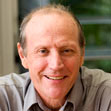 Professor Hugh Craig, University of Newcastle, Australia (6 July - 2 August 2015)
Professor Hugh Craig, University of Newcastle, Australia (6 July - 2 August 2015)
Renaissance literature expert Professor Hugh Craig is a man of letters. But the computational stylist is equally a man of numbers.
Craig is the Director of the Centre for Linguistic and Literary Computingat the University of Newcastle, Australia, and will be hosted by Dr Gillian Wright.. He has been an advocate of computer-assisted analysis of language in literature since the controversial field began to emerge in the 1980s.
He has devoted decades of research to proving that statistics can help us analyse and appreciate literary texts.
Craig's work is based largely on frequency data and has led to several breakthrough findings in regard to Shakespearean works. Using his computational techniques he found that Shakespeare was the likely author of a number of scenes from the play ‘The Spanish Tragedy’ that had previously been attributed to the playwright Ben Jonson. The results are presented in his 2009 co-edited book Shakespeare, Computers and the Mystery of Authorship.
Craig's research builds on the work of the centre's founder, Emeritus Professor John Burrows, who was the first to establish that simple function words such as "he", "and", "but" and "if" were rich in stylistic information when analysed using computational techniques.
In a novel cross-disciplinary exercise, Craig employed the expertise of Professor Pablo Moscato, who heads the University's bioinformatics program, to assist in the analysis of texts. The pair undertook a joint project comparing the structure of language in Shakespeare's plays and poems, which returned interesting evidence of a vast disparity in style between the two literary disciplines.
Craig has also linked with University speech pathology researchers to study how computational linguistics can be applied in the health sphere.